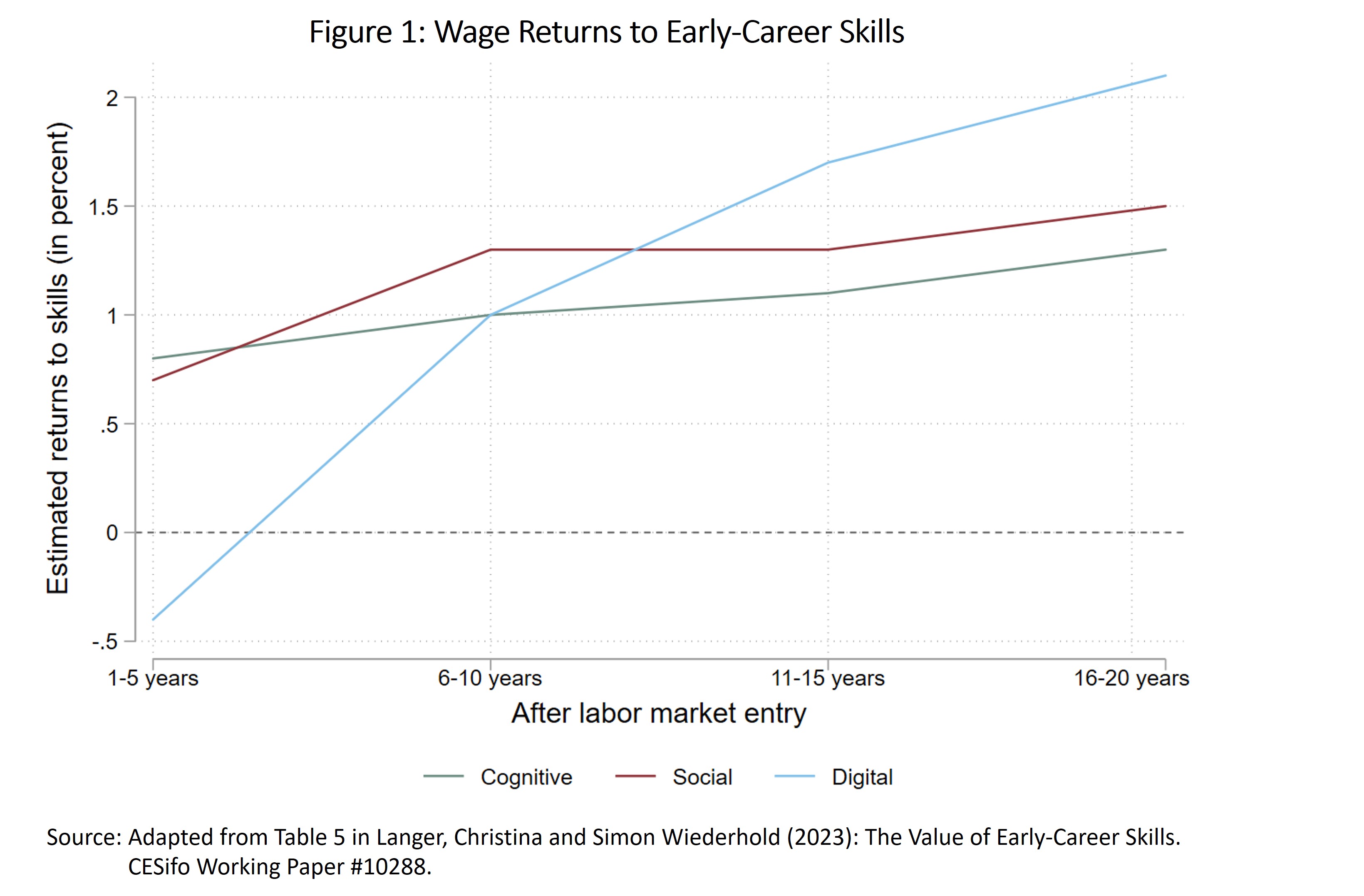Workshop: How Novel Ways of Leveraging Data Reveal Future Skills Needs
It was the ideal line-up for a workshop to explore the future of work: Pillars hand-in-hand with its partner the ifo Institute and the Chamber of Commerce and Industry for Munich and Upper Bavaria. The task: to review how data can be leveraged to ascertain not only the state of skills availability, but also which skills will be needed in the future. The workshop was held in Munich on 23 March 2023, and offered representatives of industry, public administration and the education sector a chance to discuss findings directly with front-line researchers.
Most usefully for this endeavour, the Chambers of Industry and Commerce are co-responsible in Germany for the development of vocational training curricula, making them the go-to partner for the event.

The workshop was opened by Simon Wiederhold (Pillars and Halle Institute for Economic Research, IWH), who presented his research findings on "What do apprenticeship plans tell us about the skills of young employees in Germany?". There are hardly any suitable data on worker skills, especially at the beginning of workers’ careers. To overcome this, Simon and his co-author Christina Langer took advantage of the fact that the skills apprentices learn during their vocational training in Germany are codified in detail and uniformly throughout the country’s training plans, specifying the exact duration each skill is taught. Using this as the foundation, they developed novel measures of early career skills.
To answer their key question, namely how these skills pay off over the career, they linked the Sample of Integrated Labour Market Biographies (Stichprobe der Integrierten Arbeitsmarktbiografien, SIAB) to the training occupation of apprenticed workers. They found that the returns to cognitive, social and digital skills—some of the most common skills taught —increase over the career: 16-20 years after labour market entry, an additional month of learning cognitive skills is associated with 1.3% higher wages, as compared to 0.8% in the first five years post-entry. The returns to social and digital skills are even higher, at 1.5% and 2.1%, respectively. In particular, the value of digital skills has risen strongly since 1990, suggesting a greater importance of new technologies in the labour market.
The second presentation, "Labour market analysis with Indeed real-time data: What apprentices want and what employers offer", was given by Annina Hering (of Indeed Hiring Lab). Indeed is an online job board that aggregates job postings from other websites, including job boards, recruiting companies, and corporate career sites. Indeed is active in more than 60 countries; its German website alone boasts 1.3m. new job ads and 5.9m unique visitors per month. The analysis of job postings and jobseeker search behaviour on the site provides real-time insight into current labour market trends on both the supply and the demand side. For example, the data show that more and more job ads offer flexible working hours, while more and more jobseekers are looking for jobs that offer the option to work from home. The data also allow to draw inferences about the match between demand and supply. For example, the data show that in Bavaria, employers are most often looking for trainees in the retail sector, while this is not top-of-the-list among prospective trainees.
Given Indeed’s data capability for offering insights into the latest labour market developments, it is being used by Destatis, the OECD and for journalistic research.
The final presentation, by Oliver Falck (Pillars and ifo), was also based on the analysis of online job ads. "Zoomed in: Skills and competencies sought in Munich and Upper Bavaria based on job ads".
The analysis, based on 1.8 million job ads for Upper Bavaria between 2019 and mid-2022, found that, on average, 60% of the skills required in a job ad are those that allow domain-specific knowledge to be applied in a specific situation, 30% are expert knowledge, and the remaining 10% are language skills (including foreign languages). The most common skills specified in job ads are: adaptation and flexibility, teamwork, analysing digital data, problem solving, and using digital applications.
Of all these skills, digital ones are essential, required in 70% of the job ads analysed. As expected, job ads from IT service providers top the rankings, but the automotive industry is not far behind. The skill profiles required for jobs are becoming more complex. For software developers, for example, it is not enough to be familiar with computers and programming languages. To succeed in this profession, one must also have a high degree of flexibility, problem-solving skills and creativity, and feel comfortable working in a team. Conversely, retail clerks need to also be able to handle digital data and applications.
For decision-makers in politics and education, these results mean:
- In addition to teaching domain-specific knowledge, courses should also focus on teaching digital competencies and transferable skills.
- Transferable skills and (in-depth) digital competencies are key assets that continue to gain in importance.
- Skills profiles for most occupations are growing increasingly complex and diverse, which suggests that employers would be better advised to advertise not for particular occupations, but for the skills they need.

In the concluding panel discussion, the three presenters debated with the audience the opportunities offered and challenges posed by new unconventional data. There was agreement that the quality of new and often unstructured data must be scrutinized and critically reviewed, since such data are not subject to prior quality control and processing, e.g., by statistical offices. Therefore, major effort is needed to understand the data and to find out which analyses and conclusions are possible on the basis of this kind of data.
The pre-processing and structuring of such data is very time-consuming, requiring either bespoke algorithms to be developed, or manual processing. This is hardly feasible for researchers from academia with temporary contracts and publication pressure. Thus, there is great potential for cooperation between data providers and the scientific community: data providers to collect and prepare the data, which then the scientific community analyses and uses to derive policy recommendations.
The discussion also showed that the potential of new data would be much greater if more data sets could be linked. In Germany, however, the Federal Statistics Act (Bundesstatistikgesetz) stands in the way. It states that data from official statistics may only be linked to publicly accessible data. Often, however, research data contain, for example, personal information and therefore cannot be made public, which renders it ineligible for linkage with data from official statistics.
In addition, the provision of data by the statistical offices themselves as well as by most public sector outfits needs to be improved substantially. For instance, the data on vocational training curricula are only provided as pdf files, which have to be further processed by the researchers to make them usable. Moreover, open data portals are updated only irregularly and with a significant time lag.
The question was raised of why there are so many differences in data access and citizen attitudes towards data sharing across the EU, even though all countries are subject to the same legislation, the General Data Protection Regulation (GDPR). One reason could be insufficient digital literacy among the general public and an associated lack of understanding of how data are protected and what opportunities arise from using it. A public discussion is needed around the value of data and what we lose if we do not exploit it. This applies not only to economic activities, but also, for example, to medical research or traffic planning.
There was also agreement that more digital skills need to be taught and refreshed throughout the entire career. This goes from quicker updating of apprenticeship plans to developing digital skills among older employees through training so as to help them to remain viable in the labour market. This is especially important in the face of demographic change—i.e., ageing societies. Finally, real-time data from the labour market should also flow more promptly into training plans and training content.
The general consensus among the workshop participants was that this kind of new data sets offer great potential for research and to inform policymaking.
